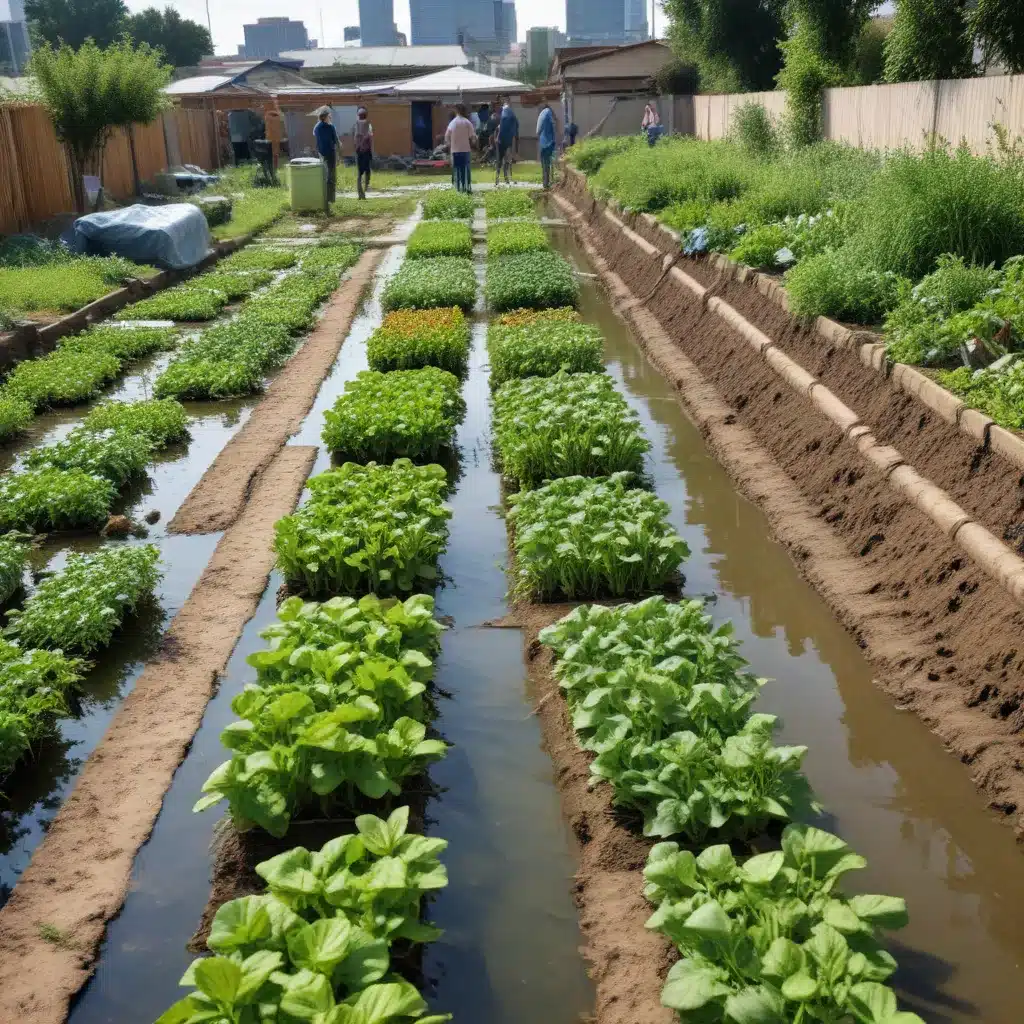
Adapting to a Shifting Landscape: The Imperatives of Water-Sensitive Urban Agriculture
As the world grapples with the mounting challenges of climate change, the intersection of water, food, and urban development has emerged as a critical frontier in the quest for sustainable and resilient communities. In an era marked by growing populations, urbanization, and the unpredictability of natural resources, the practice of water-sensitive urban agriculture (WSUA) offers a promising pathway to enhance food security, conserve precious water supplies, and build climate resilience.
Recognizing the profound implications of this nexus, the global development community has coalesced around the imperative of integrating water management, food production, and urban planning. The World Bank, in its Climate Change Action Plan, has identified Agriculture, Food, Water and Land as one of the five key transitions needed to tackle the Paris Agreement. Similarly, the UN has emphasized the criticality of addressing the interlinkages between climate change, water, and food security through its Sustainable Development Goals.
At the heart of this evolution lies the concept of WSUA – an approach that seamlessly blends urban agriculture with water-sensitive design principles. By harnessing the power of nature-based solutions, WSUA aims to create thriving food systems that are adaptive, resource-efficient, and harmonious with the urban environment. Through strategic interventions in urban planning, irrigation, and crop selection, WSUA enables communities to harness the potential of urban spaces to enhance food production, while simultaneously safeguarding water resources and ecosystem services.
Navigating the Challenges: Leveraging WSUA for Climate Resilience
As climate change exacerbates the uncertainties surrounding water availability and food security, the need for innovative, holistic approaches has never been more pressing. WSUA offers a multifaceted response to these intertwined challenges, with the potential to deliver a triple-win outcome:
-
Enhanced Food Security: By integrating agricultural production into the urban fabric, WSUA can boost the availability and accessibility of nutritious, locally-grown food, improving food security for city-dwellers. The strategic use of water-efficient irrigation techniques, drought-tolerant crops, and integrated pest management can further enhance the resilience of urban food systems.
-
Water Conservation: WSUA prioritizes the judicious use and recycling of water resources, employing strategies such as rainwater harvesting, greywater reuse, and precision irrigation. This not only reduces the strain on freshwater supplies but also mitigates the risks of water scarcity, which can have devastating impacts on agricultural productivity.
-
Climate Change Adaptation: The nature-based solutions inherent in WSUA, such as urban greenspaces, urban forests, and constructed wetlands, can help cities adapt to the impacts of climate change. These features can regulate microclimate, reduce urban heat island effects, and enhance ecosystem services that bolster the resilience of urban communities.
By harnessing the power of WSUA, cities around the world are pioneering innovative pathways to tackle the interrelated challenges of water scarcity, food insecurity, and climate change. From urban rooftop farms in Singapore to community gardens in Nairobi, these initiatives are demonstrating the transformative potential of integrating water management, food production, and urban planning.
Scaling Up Impact: Strategies for Successful WSUA Implementation
Realizing the full potential of WSUA requires a multifaceted approach that engages stakeholders across the spectrum – from policymakers and urban planners to community-based organizations and individual citizens. Here are some key strategies for scaling up the impact of WSUA:
1. Integrated Urban Planning: Integrating WSUA principles into comprehensive urban planning and development strategies is crucial. This can involve designating land for urban agriculture, incorporating water-sensitive design features, and incentivizing the incorporation of WSUA in new construction and retrofits.
2. Community Engagement and Capacity Building: Empowering local communities to participate in the design, implementation, and stewardship of WSUA initiatives is essential. This can include training programs for urban farmers, community gardening workshops, and the development of user-friendly technologies and resources.
3. Innovative Financing and Incentives: Mobilizing financial resources and creating incentive structures to support WSUA projects is key to driving widespread adoption. This can involve public-private partnerships, green financing mechanisms, and the integration of WSUA into climate adaptation and food security funding streams.
4. Policy and Regulatory Frameworks: Establishing enabling policy and regulatory frameworks at the national, regional, and local levels can create a conducive environment for WSUA to thrive. This may include water allocation policies, land-use regulations, and the integration of WSUA into climate action plans and food security strategies.
5. Knowledge-Sharing and Collaboration: Fostering knowledge-sharing platforms, peer-learning networks, and international collaboration can accelerate the dissemination of best practices and innovative WSUA solutions. Initiatives like the Joint Action for Water blog can play a vital role in connecting practitioners, policymakers, and researchers to drive progress.
By embracing these strategies, communities worldwide can unlock the transformative potential of WSUA, positioning themselves at the forefront of the global effort to build climate-resilient, water-secure, and food-abundant cities.
Conclusion: Cultivating a Resilient Future through Water-Sensitive Urban Agriculture
As the world navigates the complexities of climate change, water scarcity, and food insecurity, the practice of water-sensitive urban agriculture emerges as a powerful solution. By seamlessly integrating water management, food production, and urban planning, WSUA offers a holistic approach to enhancing food security, conserving precious water resources, and building climate resilience in cities around the globe.
Through innovative initiatives, collaborative partnerships, and supportive policy frameworks, the promise of WSUA can be realized, empowering communities to thrive in the face of a rapidly changing environment. By embracing this transformative approach, we can cultivate a resilient future where urban spaces become hubs of sustainable food production, water stewardship, and climate adaptation – a future that safeguards the well-being of present and future generations.

